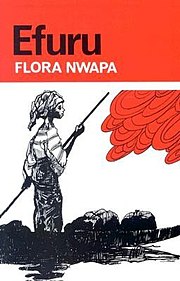|
Efuru
Efuru is a novel by Flora Nwapa which was published in 1966 as number 26 in Heinemann's African Writers Series, making it the first book written by a Nigerian woman, in fact, any African woman, to be published internationally.[1] The book is about Efuru, an Igbo woman who lives in a small village in colonial West Africa. Throughout the story, Efuru wishes to be a mother, though she is an independent-minded woman and respected for her trading ability. The book is rich in portrayals of the Igbo culture and of different scenarios, which have led to its current status as a feminist and cultural work. Plot summaryThe story is set in West African Igbo rural community. The protagonist, Efuru, is a strong and beautiful woman. She is the daughter of Nwashike Ogene, a hero and leader of his tribe. She falls in love with a poor farmer called Adizua and runs away with him, upsetting her people because he did not even perform the traditional wine-carrying and paying her bride price. She supports her husband financially and is very loyal to him, which makes her mother-in-law and aunt by marriage very fond of her. At this point, she accepts to be helped around her house by a young girl named Ogea in order to help her parents who are in financial difficulty. However, Adizua soon abandons Efuru and their daughter Ogonim, as his own father had done in the past. After her daughter dies, Efuru discovers that he has married another woman and had a child with her. Her in-laws try to convince her to stay with him, i.e. remain in waiting in their marital house. Efuru then tries to look for him, but after failing, she leaves his house and goes back to the house of her father, who receives her happily, since she can care for him better than others. Efuru then meets Gilbert, an educated man in her age group. He asks to marry her and follows tradition by visiting her father, and she accepts. The first year of their marriage is a happy one. However, Efuru is unable to conceive any children, so this begins to cause trouble. She is later chosen by the goddess of the lake, Uhamiri, to be one of her worshippers. Uhamiri, being known to offer her worshippers wealth and beauty but few children. Efuru's second marriage eventually also fails, as her husband mistreats her in favour of his second and third wives. Characters in Efuru
Reception and controversyThe novel Efuru is recognized as a substantial stepping stone in Nigerian literature and in the feminist movement in Nigeria, for it was “the first novel published by a Nigerian woman in English.”[2] As a result, Nwapa was awarded the title “Ogbuefi”, which translates into “killer of cow”. This title is of high importance, for it is usually acquired by men. Furthermore, Nwapa gained even more recognition for her work, as the Nigerian government granted her several prestigious awards after Efuru was released.[3] After Efuru’s first publication, it received mixed reviews. For instance, Kenyan author Grace Ogot spoke positively of the novel in a review which appeared in the East Africa Journal in 1966, stating that “of the many novels that are coming out of Nigeria, Efuru is one of the few that portrays vividly the woman's world, giving only peripheral treatment to the affairs of men.”[4] Nwapa's male counterparts, however, were not as fond of the book. Literary critic Eldred Jones and author Eustace Palmer both represent the opinion of some Nigerian male writers at the time, most of whom criticize Nwapa for focusing on the affairs of women. Later critics of Efuru, however, commend Nwapa for creating an image of female protagonists unlike that created by Nigerian male writers. Author Rose Acholonu describes Nwapa and certain other African female writers as "pathfinders", who were able to "break the seals of silence and invisibility on the female protagonist by the early traditionalist male writers."[5] Christine N. Ohale, a professor at the department of English, Communications, Media Arts and Theater in Chicago State University, mentions that Nwapa's "efforts to present brand-new, assertive and individualistic females have helped to salvage the lop-sided image that male writers have created",[6] which is mainly one of passiveness. Furthermore, critics such as Naana Banyiwe-Horne praise the use of dialogue as a stylistic element of the novel; in discussing Efuru, Banyiwe-Horne states: "The constant banter of women reveals character as much as it paints a comprehensive, credible, social canvas against which Efuru's life can be assessed."[7] Many reviewers of the novel agree that the "dialogic style established in Efuru is even more central to the novel’s thematic concerns". Through the dialogue that Nwapa uses, she is able to paint an accurate picture of what life for Igbo women is like. Critics such as Christine Loflin point out that the use of dialogue in Efuru allows a sense of African feminism to emerge, free of Western imposed values.[8] Other critics however, reprimand the excessive use of dialogue, considering the novel too "gossipy".[9] References
|
||||||||||||||||||||||
